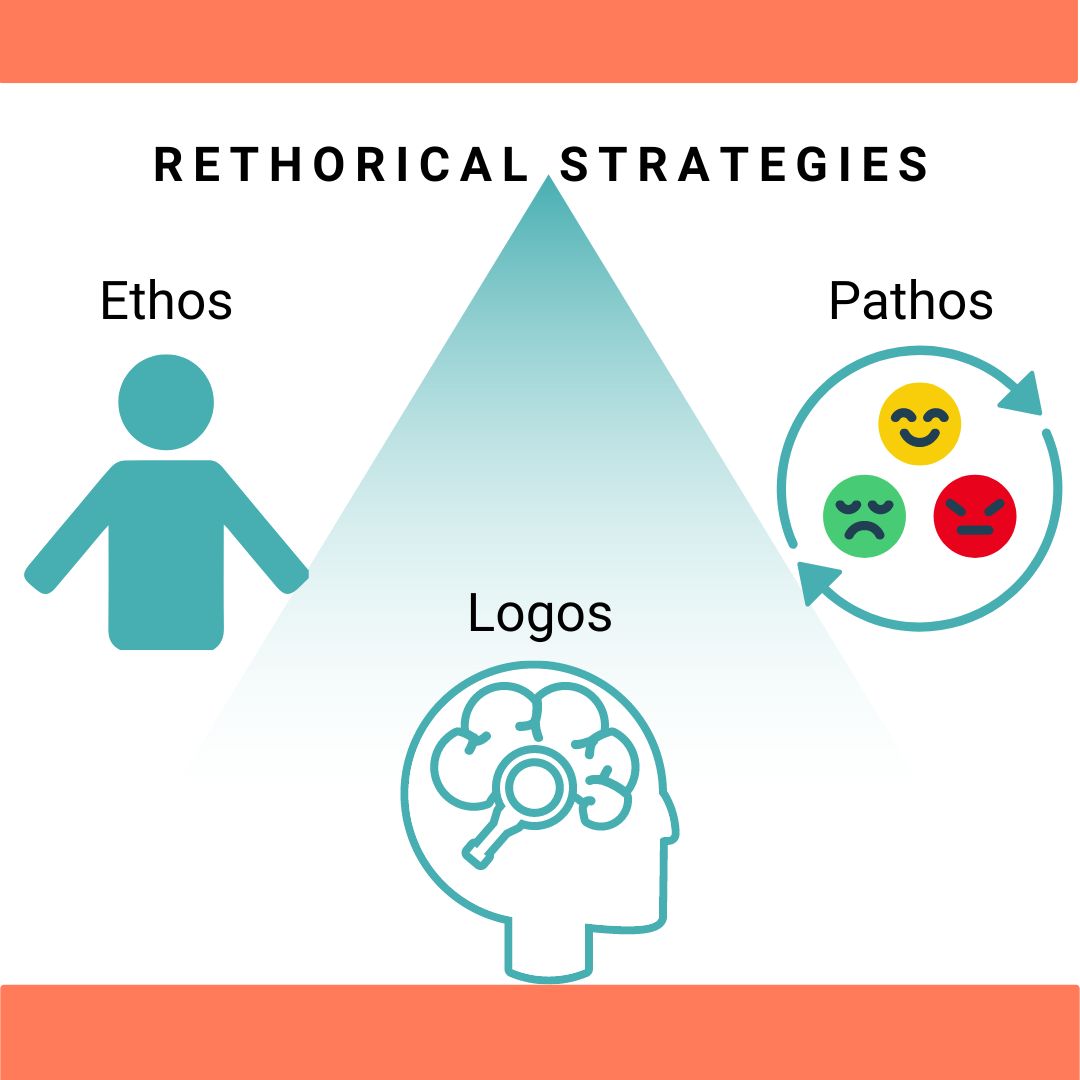Have you ever written rhetorical analysis essays? Don’t worry! We are here to help you. Rhetorical analyses may be written on any communication that aims to persuade an audience—from books and essays to movies and exhibitions. It appeared during the Classical period in Ancient Greece. The father of rhetorical strategies was Aristotle. He formed the theoretical triangle: logos (facts), pathos (emotion), and ethos (credibility).
What is a Rhetorical Analysis Essay?
In a rhetorical analysis, the writers look at the work of another author or artist and give their opinion about it. Instead of giving a summary, you have to figure out how the original authors are trying to make their arguments. The writer’s goal is to analyze the thesis and rhetorical devices of the other authors and establish an independent mark. The writer talks about different parts of the text they are analyzing: logos, pathos, and ethos.
Rhetorical Strategy: Key Concepts in Rhetoric

Aristotle discussed the power of language as a significant mechanism. He described the three rhetorical strategies of Ethos, Logos, and Pathos. The sciences pointed out a definition for describing the functioning of rhetorical strategies: the rhetorical triangle. Consequently, the correct application of the triangle makes the process of essay writing comfortable.
It is the sole mechanism for attracting the audience and impacting their thoughts and minds.
Pathos
Pathos (Latin – emotion) is the most direct route to attract an audience. Most people’s first reactions are based on their emotions before their rational minds can calm down. However, it would help if you use caution. If you want your audience to trust you and believe what you’re saying, you need to back up any emotional arguments you make with evidence. This means avoiding the overuse of pathos, which may leave them feeling emotionally misled or even furious.
Logos
Logos (Latin – logic) is where these truths come into play. To convince your readers that you’re telling the truth, you’ll need to back up any assertions with evidence from research or science. It is often used in academic writing when arguments are based on axioms and logic rather than emotion. This part of the rhetorical analysis essay is responsible for trustworthiness. The Rhetorical Triangle can work when your audience can check the sources of your facts. Seeking help with research papers can be a great way to ensure that your arguments are well-founded and reliable.
Ethos
Ethos (Latin for “ethics”) refers to your actions to build a reputation as an honest and trustworthy author. It is the unchangeable details when an argument for a readership with whom you disagree. Credibility was created via the usage of logos and pathos. The correct connections make you a winner over an unreceptive audience. This indicates not just your essential knowledge but also your heart for the topic.
How to Write a Rhetorical Analysis Essay?
The best way to start is to understand what is a rhetorical analysis essay. Please, pay attention that rhetorical analysis starts with a short plan of elements for your future essay.
The rhetorical analysis essay outline:
- Be passionate about the theme. Before starting the work on your essay, make a list of your wished topics. It helps you to understand if there is enough material and opportunity to observe all details.
- Follow the requirements for a rhetorical analysis essay. Don’t mess with a critical analysis essay. The jam of different genres can harm your essay.
- Background research ensures that your topic can be analyzed and valuable for your potential audience.
- Check the resource to ensure that your crucial element “logo” is completed.
- Don’t forget about your notes. It helps you to follow all requirements of the structure and outline all essential points.
SOAPStone Strategy
The SOAPSTone is an abbreviation for Speaker, Occasion, Audience, Purpose, Subject, and Tone. It is commonly used in rhetorical analysis, to uncover literary works’ deeper meanings
It is time to break down the abbreviation:
Speaker. The Voice of the Story is the Speaker. Whoever tells the story. When analyzing a piece of literature, you can focus on figuring out a character’s voice or putting your voice into it. You should include the writer’s first and last name. Remember the author’s credentials; it is essential to point them out briefly.
Who introduces these analyses?
Occasion. It relates to the kind of text and the circumstances that existed when it was written. That’s why you should understand the peculiarities of the genre to write your essay correctly. For instance, there is a significant difference between an article for a scientific conference and a letter addressed to a colleague on the same subject. In other words, the rhetorical situation affects any writing.
What is your reason for writing this analysis?
Audience. Your targeted readers. This is relevant to the occasion, since the occasion may include information about the audience.
Who are your readers?
Purpose. The writer’s goal or the thought behind the work.
What do you want to reach by writing this analysis?
Subject. The writer’s main topic flows through all parts of the essay.
What does the writer want to convey? What’s behind the story’s surface that could hold the key to understanding it?
Tone. The story’s tone reflects the author’s worldview. Syntax, word choice, and imagery all contribute to the work’s overall meaning and ability to communicate its central point.
What about your audience’s feelings while reading your work?
Using the six components of the SOAPSTone strategy, you can analyze text (such as a series of books, science journal, speech, detective stories, or any other collection of documents) to determine what the author intended to accomplish with the document and how audiences may (or may not) respond to the text.
Rhetorical Analysis Essay Structure (Thesis, Body, and Conclusion)
When you start to write the analysis, follow the structured recommendation. An understanding of the structure assists you in analyzing the influence of a text, helping to learn more about your topic. All rhetorical essays include the standard “introduction/ body/ conclusion” paragraph structure. Your build material is the thesis. More thesis established by the facts, more opportunity to make text strong enough for your audience.
Rhetorical analysis introduction
This instructive section demonstrates that you comprehend the text’s aim.
The introduction aims to hook your audience. Science gives us the definition “hook statement,” which means owning your target audience’s attention in one sentence. Also, the beginning of your work is written to set the tone for the whole essay. It also has a list of all the ideas to be talked about in the content.
In addition, your thesis statement should be a single line at the conclusion of the introduction that highlights the argument you will make about the writer’s choices and techniques.
Rhetorical analysis body
It is the central part of your work. All proofs and facts are described here. This part allows you to strengthen your thesis and position. However, before building your rhetoric strategy, we made the list of advice:
- Create a unique paragraph for each method, and always include relevant sources instead of jamming them together.
- Your body section should start with the relevant sentence. It makes the reading process comfortable, structured logically, and your potential reader can find the proper information at a glance.
- You need to “hide” the central claim of the essay through your whole body sector. It means that your audience refers to your main thesis during the reading.
- Remember your sources. The effort spent verifying it is well worth the benefit to your credibility.
Rhetorical analysis conclusion
Your conclusion should summarise what you’ve said in your essay’s main body. Restate the thesis and explain how it’s proven. It’s important to remember that the information in the conclusion section is short. Also, new ideas should be kept from this part of the essay.
If you want to make your article more emotional, you can provide a call to action for your readers in the conclusion.
Tips for Writing a Rhetorical Analysis
The best way to check if your rhetorical analysis matches the components of the rhetorical situation:
- Purpose: Why are you writing this? What kind of circumstances has become the reason for your essay?
- Audience: Who will read it?
- Genre: What is your style?
- Stance: What do you feel when you write it? What does your audience feel when reading it?
- Media and visuals: How to connect with your audience?
More practice
The rhetorical analysis takes time and practice. Try writing your thoughts on some of your favorite books, songs, and YouTube video. The best essays are written when the writer is passionate about their writing, so choose a subject you’re keen on.
Grammar and Punctuation
Include references and examples in your analysis. Always edit your final work for grammar, punctuation, spelling, and typos. Ask your friends to look through your paper, or use the custom essay service if you feel tired.
Correct Format
A rhetorical analysis essay should be created in the third-person point of view (he, she, they) rather than the first person (I, we).
Be strong in your tone
Use strong verbs (describes, establishes, supports) that indicate analysis rather than weak ones that seem like you’re summarising (tells, this quote shows, explains). This form of analysis is impartial, therefore, avoids personal views. When supporting your argumentation, use quotations, paraphrases, facts, and examples. Use quotations sparingly, and never start a paragraph with one.
In conclusion, writing a rhetorical analysis essay requires a keen eye for detail and a deep understanding of the author’s rhetorical strategies. To ensure a successful essay, it’s important to focus on specific elements of the text, such as appeals to ethos, pathos, and logos, and to analyze how these elements contribute to the overall effectiveness of the argument. Furthermore, crafting a clear and specific thesis statement is essential for guiding the essay and ensuring coherence throughout the analysis. For those who may struggle with their essay, buying a thesis is an option that may be worth considering.








